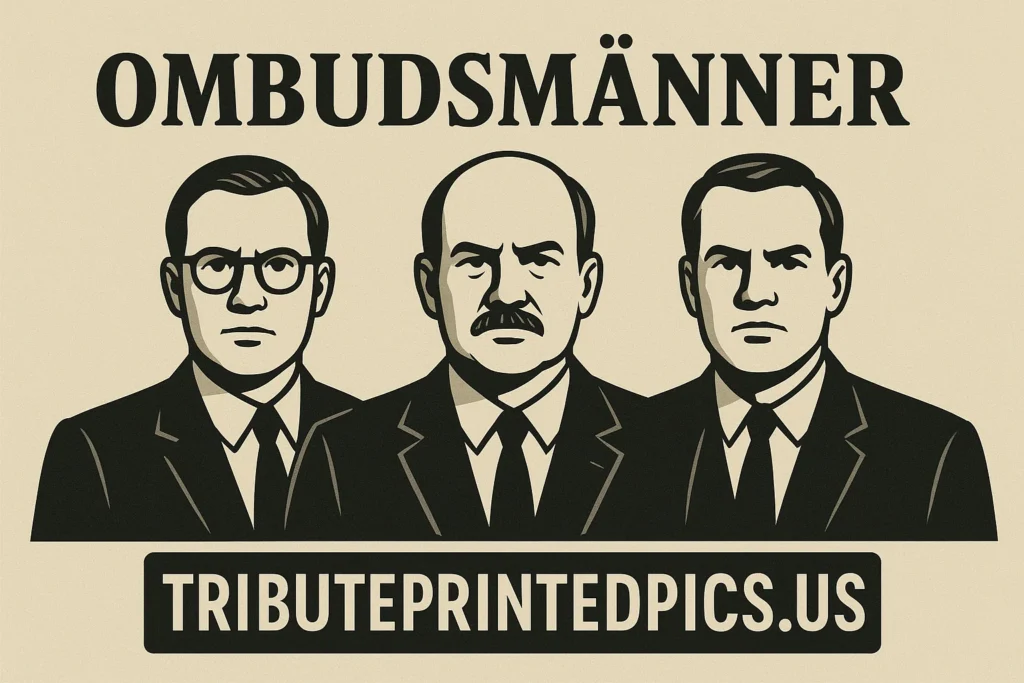Introduction to Ombudsmänner
The word Ombudsmänner has become central in discussions about fairness, justice, and accountability. It refers to independent officials who investigate complaints and ensure that organizations, governments, and businesses act with integrity. While the concept originated in Scandinavian governance centuries ago, today it has spread worldwide. The role has expanded beyond government to cover corporate governance, healthcare disputes, consumer protection, and even education mediation.
People often seek an Ombudsmann when they feel unheard or unfairly treated. By offering grievance redressal, complaint handling, and neutral mediation, Ombudsmänner have built trust in institutions. Their presence reassures citizens that transparency and fairness remain possible, even in systems often criticized for administrative abuses.
Historical Origins and Evolution
The word Ombudsmann traces back to Sweden in the 19th century. At that time, the Swedish Parliament introduced an official watchdog to review the conduct of government agencies. This independent review system was designed to protect citizen rights and correct any misuse of power. It became a groundbreaking example of institutional oversight, inspiring similar offices around the world.
Over the years, the Ombudsmänner concept expanded into different countries, adapting to local needs. In some nations, it focused on administrative complaints, while in others, it targeted corporate governance, consumer protection, and financial services fairness. What remained constant was its role as an oversight body committed to ethical practices and justice.
Core Duties and Responsibilities
The duties of Ombudsmänner revolve around neutrality and independence. They investigate complaints from citizens, employees, or consumers who believe they have been treated unfairly. By conducting an impartial review, they bring accountability to organizations and institutions.
Their responsibilities include:
- Handling complaints through fair investigation
- Mediating conflicts as a neutral mediator
- Recommending corrective actions for institutions
- Protecting citizen rights against misuse of authority
Through these actions, Ombudsmänner promote transparency and fairness. Their ethical practices make them a trusted mechanism for grievance redressal and institutional oversight.
Types of Ombudsmänner
Over time, several forms of Ombudsmänner have emerged, depending on the setting.
- Government Ombudsmänner handle public grievances about administrative abuses, ensuring that public accountability remains intact.
- Corporate Ombudsmänner mediate workplace disputes and reinforce corporate governance practices.
- Healthcare Ombudsmänner focus on healthcare disputes, ensuring patients receive fair treatment.
- Academic Ombudsmänner provide education mediation by resolving student and faculty conflicts.
This variety highlights the flexibility of the complaint resolution process across different sectors. Regardless of type, Ombudsmänner remain committed to fairness, independence, and ethical practices.
Legal Framework and Authority
The power of Ombudsmänner rests on legal framework and compliance. Many countries pass laws that define their scope and authority. These laws enable Ombudsmänner to demand documents, question officials, and recommend reforms.
Still, the role is not without challenges. In some systems, Ombudsmänner can only issue recommendations, not binding decisions. This limitation can weaken their effectiveness, especially in cases of administrative abuses. However, even without legal enforcement, their reports carry moral weight and often pressure institutions into corrective action.
Skills and Qualities of Effective Ombudsmänner
To be effective, Ombudsmänner must display certain qualities. Neutrality is essential because any sign of bias undermines trust. Strong communication skills help in explaining decisions clearly, while analytical thinking supports complex investigations.
Equally important are ethical practices. An Ombudsmann who upholds integrity builds trust in institutions and ensures citizens feel their complaints are handled with fairness. The blend of technical knowledge and moral strength defines the credibility of this role.
Ombudsmänner in Governance and Public Services
In governance, Ombudsmänner act as a safeguard for democracy. They ensure that public agencies respect citizen rights and follow proper procedures. Their reviews protect citizens from administrative abuses that may otherwise go unchecked.
In public services, they provide grievance redressal for complaints related to healthcare, education, housing, and welfare. This strengthens public accountability, ensuring that state services remain fair and transparent. Citizens rely on Ombudsmänner to hold governments accountable when systems fail.
Ombudsmänner in Organizations and Businesses
Modern corporations also benefit from Ombudsmänner. Workplace disputes, discrimination claims, or unfair practices can all damage trust in institutions. A corporate Ombudsmann offers a neutral space where employees can raise concerns without fear.
This complaint resolution process helps businesses avoid legal conflicts, improves corporate governance, and supports ethical practices. For industries like financial services, where fairness is crucial, Ombudsmänner reassure customers that their rights will be respected.
Linguistic and Cultural Importance
The word Ombudsmann is singular, while Ombudsmänner is plural. Both terms carry strong cultural significance. In German and Scandinavian societies, they symbolize accountability, fairness, and ethical mediation.
In other cultures, the role may not carry the same title, but similar mechanisms exist. From citizen rights commissions to consumer protection bodies, the concept of an independent mediator exists globally, showing how deeply societies value trust and fairness.
Comparing Ombudsmänner with Other Roles
Ombudsmänner differ from mediators, legal advocates, or compliance officers. Mediators resolve disputes between two parties but lack oversight authority. Legal advocates fight for their client’s interests, not neutrality. Compliance officers ensure adherence to company rules but remain part of the institution.
By contrast, Ombudsmänner stand as independent review authorities. Their role as neutral mediators ensures both sides are heard without bias. Their position outside the direct power structure gives them credibility in grievance redressal.
Global Perspective of Ombudsmänner
Today, Ombudsmänner exist across continents. The European Union has a strong Ombudsman office that reviews administrative abuses. In Canada, the office deals with consumer protection and healthcare disputes. In South Africa, the Public Protector addresses government misconduct.
International institutions like the United Nations also use Ombuds offices to ensure fairness in their internal structures. This global spread shows the universal need for transparency and fairness in governance.
Challenges Faced by Ombudsmänner
Despite their importance, Ombudsmänner face challenges. Political pressure often threatens their independence, especially in countries where governments dislike oversight. Limited funding restricts their ability to investigate effectively.
Another challenge is the rise of modern disputes, especially in digital spaces. Issues like data privacy, online consumer protection, and global corporate accountability add complexity to the complaint resolution process. Ombudsmänner must adapt to these new realities while maintaining neutrality and fairness.
The Future of Ombudsmänner
Looking ahead, Ombudsmänner will likely embrace technology. Digital tools can streamline complaint handling and allow faster independent reviews. Artificial intelligence may support the complaint resolution process, though ethical practices must guide its use.
Future Ombudsmänner will also need to address global issues like cross-border financial services fairness, healthcare disputes in international systems, and consumer protection in e-commerce. Their continued role will ensure that trust in institutions remains strong even as society evolves.
Conclusion
The role of Ombudsmänner remains as relevant today as it was centuries ago. From handling grievances in government to building trust in corporate governance, they stand as neutral mediators protecting citizen rights. Their commitment to transparency, fairness, and ethical practices makes them vital in both public and private sectors.
In a world where people often feel powerless against large institutions, Ombudsmänner serve as a reminder that oversight bodies can protect citizens and ensure justice. Their evolution into new fields proves that the demand for independent review and grievance redressal will only grow in the years ahead.
FAQs about Ombudsmänner
Q1. What does Ombudsmänner mean?
It is the plural of Ombudsmann, referring to officials who handle complaints and ensure fairness in institutions.
Q2. Do Ombudsmänner have legal power?
Their authority depends on the legal framework and compliance laws of each country. Some have binding powers, others only recommend.
Q3. Where do Ombudsmänner work?
They operate in government, corporate governance, healthcare disputes, financial services, and even education mediation.
Q4. How do Ombudsmänner differ from mediators?
Unlike mediators, Ombudsmänner act as oversight bodies with independent review powers, not just facilitators of dialogue.
Q5. Why are Ombudsmänner important today?
They ensure transparency, protect citizen rights, and provide grievance redressal in an age of increasing institutional complexity.


